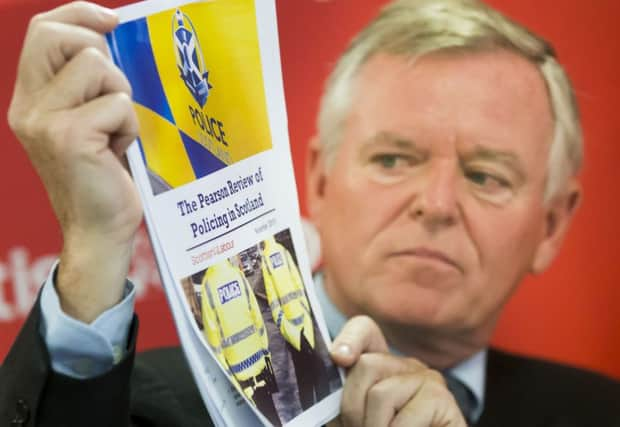Police should give ‘more power’ to local commanders


The report also criticised the Scottish Police Authority and called for a committee of MSPs to be set up to oversee the police and help end what Mr Pearson, a former assistant chief constable, called the “incestuous relationship” that exists between ministers and senior officers.
Mr Pearson, Labour’s justice spokesman at Holyrood, asid: “During my meetings across the country, local people told me that the link between their communities and bobbies on the beat has been lost, despite the hard work and dedication of frontline officers.
Advertisement
Hide AdAdvertisement
Hide Ad“Those officers feel the breakdown too - the recent Police Scotland staff survey reported that officers feel they are losing touch with local people because of the ‘one-size-fits-all’ policing model.”
He added: “Two years on from its creation, Police Scotland needs a shake up so that power once again lies with local decision makers and we get back to the kind of community policing that made Scotland the envy of the world at one time.
“My recommendations aim to do just that, giving officers more autonomy to answer questions raised by communities, as well as enabling better local oversight and improving the relationship between the Scottish Police Authority (SPA) and local communities.”
Mr Pearson’s report said divisional commanders were more often “message carriers for the centre” rather than local decision-makers.
It said staff believed controversies such as stop and search and the row over armed policing had been caused because the chief constable operated alongside an executive group which offered “little in the way of constructive alternative views”.
The report claimed the SPA is failing in its role as watchdog and called for a new committee of MSPs to be set up to oversee Scotland’s emergency services.
Mr Pearson added: “I think the parliament is the mechanism by which we should ensure that the incestuous relationship which can sometimes exist between a cabinet secretary, a board and a chief constable, that we remove that incestuous relationship and let fresh air get into the system.”
Mr Pearson also criticised the SNP for failing to put together a business case for Police Scotland ahead of its launch.
Advertisement
Hide AdAdvertisement
Hide AdA spokesman for justice secretary Michael Matheson said: “Policing in Scotland is built on strong foundations and Graeme Pearson’s attack is hypocritical given that Labour fully backed the creation of a single police force in the face of Tory cuts from Westminster.
“His claims regarding the business case for Police Scotland is also wrong - there was a full outline business case for police reform with significant stakeholder input which was published in its entirety, and which was also backed by cross-party support.
“The fundamentals of policing in Scotland are sound and under this SNP government crime has fallen to a 41-year low, supported by the 1,000 extra officers that we have delivered - in stark contrast to England and Wales, which has seen a decrease of over 15,300 officers since 2007.”
Scottish Liberal Democrat leader Willie Rennie MSP said: “This report is an admission of guilt by the Labour Party who first proposed centralisation and then voted for the SNP’s bill even though there was no proper business plan. The Labour Party may not be in charge but they must bear some of the responsibility for what went wrong with Police Scotland.
“The consequences of centralisation have been incredibly serious. Pressure has been piled on officers and staff, police stations have locked their doors to the public, control rooms have shut, and we have seen the roll-out of inappropriate one-size-fits-all policies such as stop and search and armed police.
“Unlike Labour’s proposals, the plans Liberal Democrats have already published will guarantee communities once again have a real say over how they are policed because local policing plans will require the approval of each local authority.”